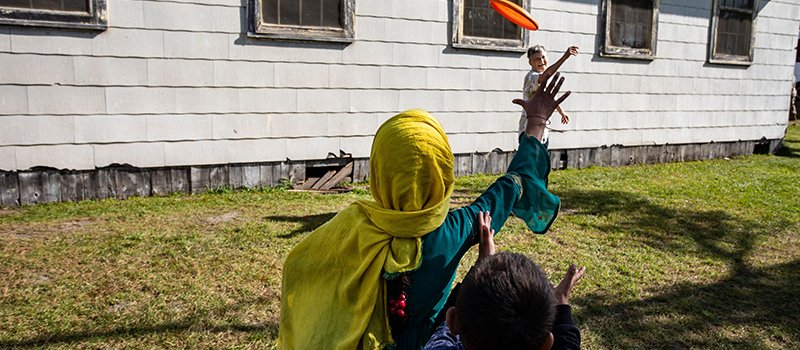Called to meet our Afghan neighbors with SAFE

Sandra Hoeser, an affiliate with FSPA, served Afghan refugees last September as a volunteer at Wisconsin's Fort McCoy. Photo credit: Barbara Davidson/AP/Shutterstock.
They are health care providers. They are education professionals. And they are people who have fled humanitarian and environmental violence waged against them in Afghanistan: those among the more than 70,000 Afghan evacuees expected to resettle in the United States under humanitarian parole in 2021. Humanitarian parole is defined by the United States Citizenship and Immigration Services as an allowance for individuals “who may be inadmissible or otherwise ineligible for admission into the United States for a temporary period for urgent humanitarian reasons or significant public benefit.”
Mobilized to meet them in the U.S. with more than relief of immediate human need is the International Rescue Committee: an organization missioned “to help people whose lives are shattered by conflict and disaster to recover and gain control of their futures.” Through its Center for Economic Opportunity, IRC has launched the Support for Afghan Financial Empowerment Initiative — assistance for Afghan refugees as they begin the arduous path to economic stability in new communities across the U.S. More specifically SAFE is “a nationwide, evidence-based, practical initiative designed to help the 70,000+ Afghan humanitarian parolees,” half of whom are women, “build a financial foundation in their neighborhoods by offering linguistic and culturally-appropriate education and counseling and access to free financing.”
“Many times when guests come to this country,” says Kasra Movahedi, executive director of IRC’s Center for Economic Opportunity, “they have training/gifts from their home countries that aren’t immediately recognized in the U.S.” SAFE is a three-year project uniquely positioned to help our new Afghan neighbors invest in themselves and their new America communities. The initiative provides tools to translate work experience from abroad to economic sustainability in the U.S. “SAFE is an unprecedented program that will support more than 70,000 guests from Afghanistan,” says Kasra, “potentially doubling IRC’s clients; a hugely significant initiative to undertake.”
With SAFE, services will be available nationally through a hybrid model that includes community-based walk-in services in key locations as well as web portal access populated with language-specific resources — information spelled out in Dari and Pashto. SAFE provisions include:
- A dedicated, in-language web portal that serves as a one-stop-shop to access all SAFE services and resources and, critically, is accessible to Afghan families no matter where they ultimately resettle in the U.S.
- Culturally-responsive, in-language financial capability services including financial education and coaching to ensure that these vulnerable, linguistically-isolated households who have limited to no understanding of American banking and financial systems are able to begin to build a solid financial foundation in their new home.
- A $10 million loan fund that will offer 0% APR auto, education, immigration and personal loans — alongside financial education and 1:1 financial coaching — to eligible Afghan households.
These SAFE measures will complement the core resettlement and workforce development services provided by refugee-serving agencies during these families’ first months in America. SAFE is projected to reach at least 50% of Afghans arriving as a part of the 2021 evacuation efforts.
Upholding the commitment to relationships proclaimed at FSPA’s 2018 Mission Assembly, one moving us to build bridges of relationships that stretch us to be people of encounter who stand with all suffering in our Earth Community, FSPA invested in the IRC and SAFE with $250,000. It is an investment that will measurably impact these relationships and the financial capability services provided to affect the social and environmental landscape of our ever-changing world.
Franciscan Sister of Perpetual Adoration Eileen McKenzie expands upon our charge to go out and meet our Afghan neighbors with SAFE.
“The FSPA response to the 2021 Afghanistan crisis, which brought thousands of refugees to Fort McCoy, Wisconsin, was one of prayer and action. In our Adoration Chapel and in the compassionate response of sisters, affiliates and partners in mission on staff, we engaged with hope for healing, peace and justice. Franciscan Sister of Perpetual Adoration Laura Nettles' coordination service was pivotal at the local and national level, and we all responded in the ways we could at the time with what we had. We aimed to impact the transition of our Afghan brothers and sisters from refugees to neighbors. We knew that resettlement, cultural adaptation and financial literacy would be ongoing challenges long after the news stopped covering the crisis. We wanted to be sure to support their transition after they left the La Crosse area. That is why we chose to invest in the IRC SAFE Initiative, a program designed to address their unique challenges of resettlement, including financial access to education, transportation, immigration processes and other needs.”
For more information about SAFE, visit irc-ceo.org.
Prayer for Migrants, Refugees and Asylum Seekers
God, no one is stranger to you
And no one is ever far from your loving care.
In your kindness watch over migrants, refugees and asylum seekers,
Those separated from their loved ones,
Those who are lost
And those who have been exiled from their homes.
Bring them safely to the place where they long to be,
And help us always to show your kindness to strangers
And those in need.
We ask this through Christ our Lord,
Who too was a refugee and migrant
Who traveled to another land
Searching for a home.
Amen
(Source: Nouwen Network)
